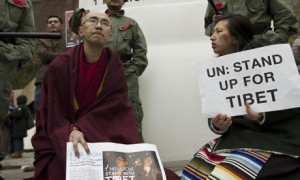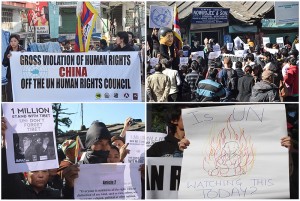China has again been awarded one of the 14 open seats in the 47-seat Geneva-based Human Rights Council despite its failure to comply with international standards put forth by the United Nations.
The re-election of China to this UN council, tasked with upholding human rights globally, is largely regarded as having undermined the credibility of the organisation. As a member of the council, China will continue to have a say as to what issues will be addressed by adopting resolutions when it chooses to do so. Because it is unlikely that China will adopt any resolution regarding Tibet, any effort to shine a light upon ongoing human rights abuses will face great resistance. However, though China’s role on the council poses a challenge, it is still possible for a hard-working majority to achieve results, according to Peggy Hicks of Human Rights Watch, an advocacy group based in New York City. Without the ability to veto, China cannot single-handedly prevent resolutions regarding human rights in Tibet.
In response to China’s bid, Tibetans and foreign supporters alike took to protest. In Dharamshala and elsewhere, Tibetan groups held campaigns to urge UN member states to demonstrate a commitment to international human rights by voting “No” to China’s bid for re-election to the UN council. Together, the Tibetan Youth Congress, Tibetan Women’s Association, Gu Chu Sum Movement of Tibet, National Democratic Party of Tibet and Students for a Free Tibet-India staged a protest in Dharamshala as part of a global campaign. Efforts were bolstered by another organisation, Avaaz, an online advocacy group. In just one week, Avaaz helped to attract over one million people to sign a petition against China’s bid. Additionally, the group participated in extensive lobbying and held a demonstration in front of UN headquarters in New York. Though the protests were ultimately unsuccessful in keeping China off the council, people in many parts of the world stood up and drew attention to China’s abuses within Tibet.

Campaigners protesting outside the UN’s headquarters in New York, US
Photo: Mustafa Bader/Demotix/Corbis
Like China, the election of Algeria, Russia, Saudi Arabia and Vietnam to the council has also drawn criticism globally. These countries regularly vote against UN initiatives to protect the rights of others, and have themselves been in violation. Since 2000, these five countries have repeatedly refused to allow visits by UN inspectors to check alleged abuses. It is generally accepted that countries failing to protect human rights domestically should not be charged with overseeing adherence to such laws.





 Print
Print Email
Email